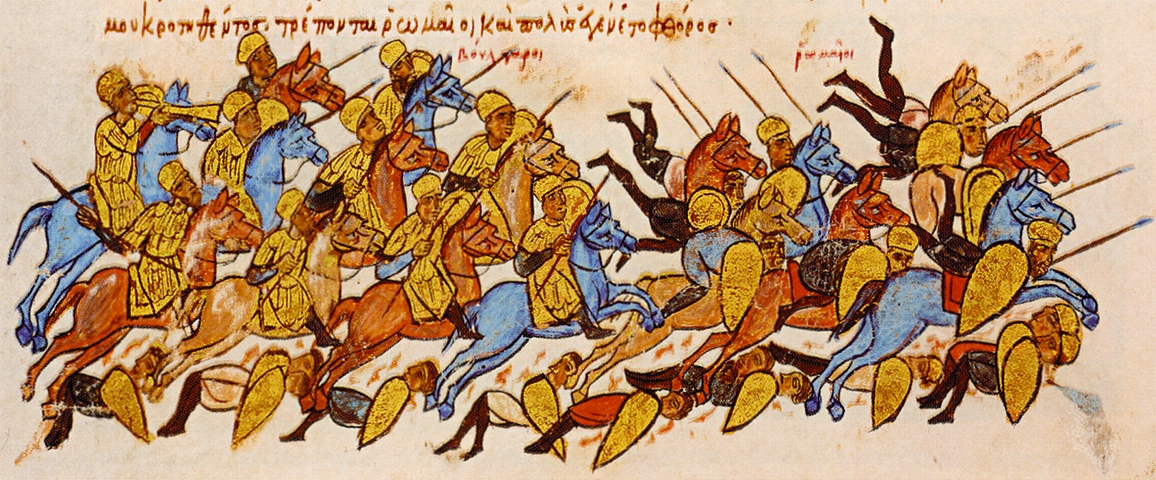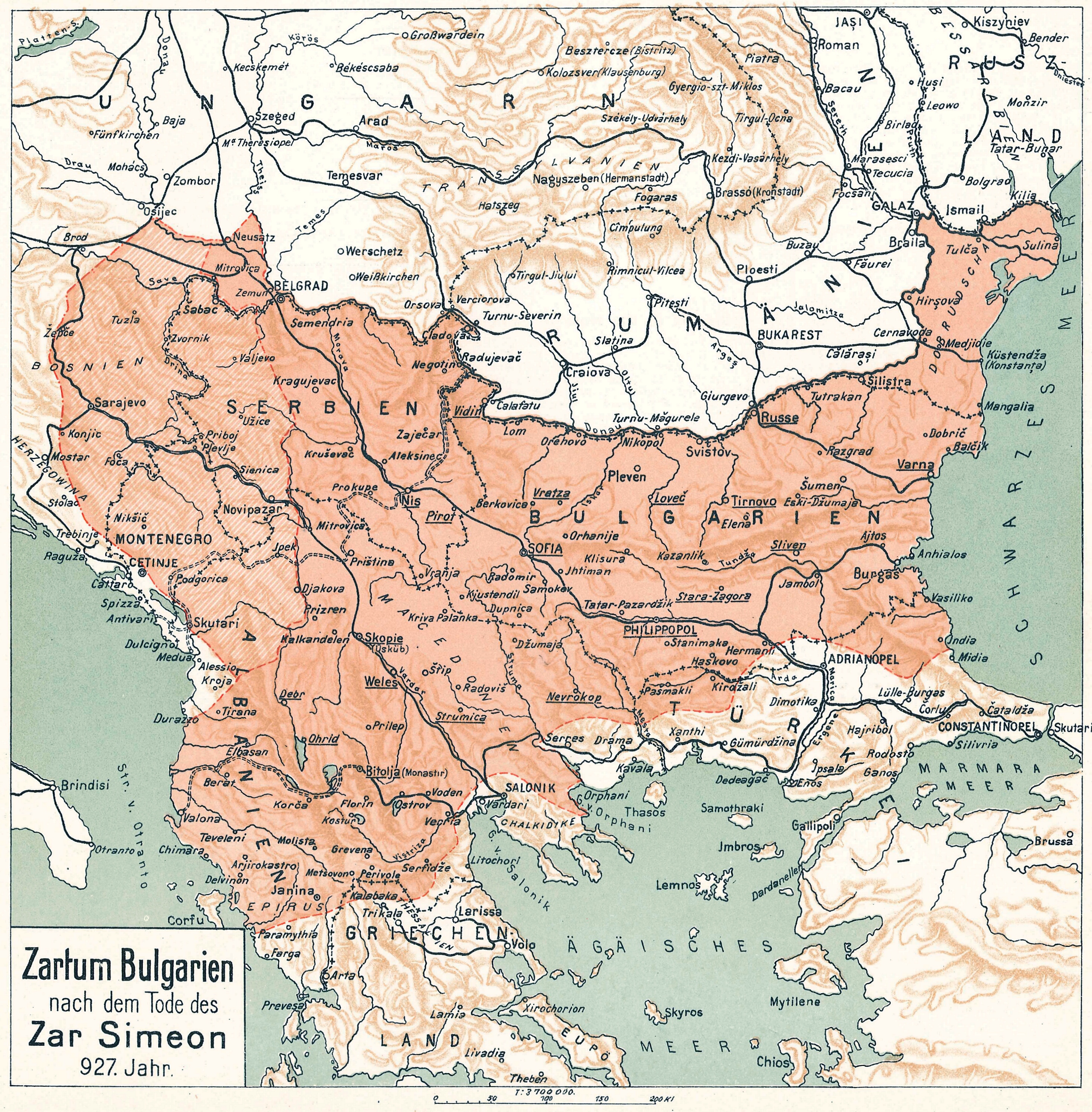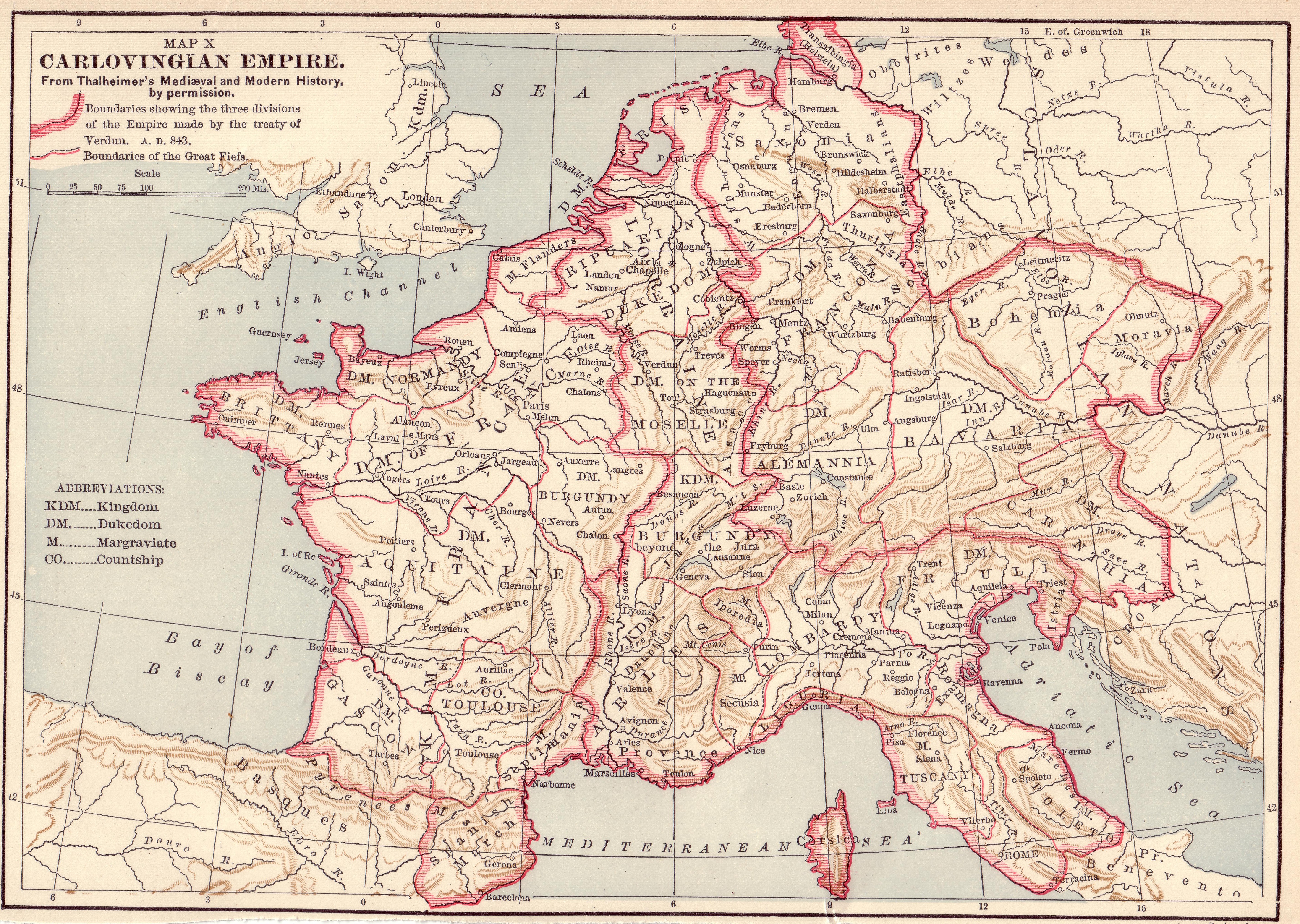|
896
__NOTOC__ Year 896 ( DCCCXCVI) was a leap year starting on Thursday (link will display the full calendar) of the Julian calendar. Events By place Europe * February – King Arnulf of Carinthia invades Italy at the head of an East Frankish expeditionary army. He storms Rome (the Leonine City), and has himself crowned Holy Roman Emperor by Pope Formosus at St. Peter's. Arnulf sets out to establish his authority in Spoleto, but suffers a stroke; he is forced to call off the campaign, and returns to Bavaria. * March – King Lambert II proceeds to re-conquer Italy. Heading north, he captures western Lombardy, and decapitates count Maginulf of Milan. In the meantime, the deposed king Berengar I recovers Verona (March of Friuli) from Arnulf's candidate, count Walfred of Verona, who dies in office with "great fidelity to the emperor". * Battle of Southern Buh: Bulgarian forces under Simeon I (the Great) defeat the Magyars, near the banks of the Southern Buh river (m ... [...More Info...] [...Related Items...] OR: [Wikipedia] [Google] [Baidu] |
Arnulf Of Carinthia
Arnulf of Carinthia ( 850 – 8 December 899) was the duke of Carinthia who overthrew his uncle Emperor Charles the Fat to become the Carolingian king of East Francia from 887, the disputed king of Italy from 894 and the disputed emperor from February 22, 896, until his death at Regensburg, Bavaria. Early life Illegitimacy and early life Arnulf was the illegitimate son of Carloman of Bavaria, and Liutswind, who may have been the sister of Ernst, Count of the Bavarian Nordgau Margraviate, in the area of the Upper Palatinate, or perhaps the burgrave of Passau, according to other sources. After Arnulf's birth, Carloman married, before 861, a daughter of that same Count Ernst, who died after 8 August 879. As it is mainly West-Franconian historiography that speaks of Arnulf's illegitimacy, it is quite possible that the two females are actually the same person and that Carloman married Arnulf's mother, thus legitimizing his son. Arnulf was granted the rule over the Duchy of Carinth ... [...More Info...] [...Related Items...] OR: [Wikipedia] [Google] [Baidu] |
Berengar I Of Italy
Berengar I ( la, Berengarius, Perngarius; it, Berengario; – 7 April 924) was the king of Italy from 887. He was Holy Roman Emperor between 915 and his death in 924. He is usually known as Berengar of Friuli, since he ruled the March of Friuli from 874 until at least 890, but he had lost control of the region by 896. Berengar rose to become one of the most influential laymen in the empire of Charles the Fat, and he was elected to replace Charles in Italy after the latter's deposition in November 887. His long reign of 36 years saw him opposed by no less than seven other claimants to the Italian throne. His reign is usually characterised as ''troubled'' because of the many competitors for the crown and because of the arrival of Magyar raiders in Western Europe. His death was followed by an imperial interregnum that lasted 38 years until Otto I was crowned emperor in 962. Margrave of Friuli, 874–887 His family was called the Unruochings after his grandfather, Unruoch II. ... [...More Info...] [...Related Items...] OR: [Wikipedia] [Google] [Baidu] |
Pope Formosus
Pope Formosus (896) was the bishop of Rome and ruler of the Papal States from 6 October 891 until his death on 4 April 896. His reign as pope was troubled, marked by interventions in power struggles over the Patriarchate of Constantinople, the Kingdom of West Francia, and the Holy Roman Empire. Because he sided with Arnulf of Carinthia against Lambert of Spoleto, Formosus's remains were exhumed and put on trial in the Cadaver Synod. Several of his immediate successors were primarily preoccupied by the controversial legacy of his pontificate. Early career Probably a native of Rome, Formosus was born around 816. He became cardinal bishop of Porto in 864. Two years later, Pope Nicholas I appointed him a legate to Bulgaria (866). He also undertook diplomatic missions to France (869 and 872). Upon the death of Louis II of Italy in 875, the nobles elected his uncle Charles the Bald to be the new emperor. Formosus conveyed Pope John VIII's invitation for Charles to come to Rome to ... [...More Info...] [...Related Items...] OR: [Wikipedia] [Google] [Baidu] |
Simeon I Of Bulgaria
Tsar Simeon (also Symeon) I the Great ( cu, цѣсар҄ь Сѷмеѡ́нъ А҃ Вели́къ, cěsarĭ Sỳmeonŭ prĭvŭ Velikŭ bg, цар Симеон I Велики, Simeon I Veliki el, Συμεών Αʹ ὁ Μέγας, Sumeṓn prôtos ho Mégas) ruled over Bulgaria from 893 to 927,Lalkov, ''Rulers of Bulgaria'', pp. 23–25. during the First Bulgarian Empire. Simeon's successful campaigns against the Byzantines, Magyars and Serbs led Bulgaria to its greatest territorial expansion ever, making it the most powerful state in contemporary Eastern and Southeast Europe. His reign was also a period of unmatched cultural prosperity and enlightenment later deemed the Golden Age of Bulgarian culture. During Simeon's rule, Bulgaria spread over a territory between the Aegean, the Adriatic and the Black Sea.Bakalov, ''Istorija na Bǎlgarija'', "Simeon I Veliki". The newly independent Bulgarian Orthodox Church became the first new patriarchate besides the Pentarchy, and Bulgarian ... [...More Info...] [...Related Items...] OR: [Wikipedia] [Google] [Baidu] |
First Bulgarian Empire
The First Bulgarian Empire ( cu, блъгарьско цѣсарьствиѥ, blagarysko tsesarystviye; bg, Първо българско царство) was a medieval Bulgar- Slavic and later Bulgarian state that existed in Southeastern Europe between the 7th and 11th centuries AD. It was founded in 680–681 after part of the Bulgars, led by Asparuh, moved south to the northeastern Balkans. There they secured Byzantine recognition of their right to settle south of the Danube by defeatingpossibly with the help of local South Slavic tribesthe Byzantine army led by Constantine IV. During the 9th and 10th century, Bulgaria at the height of its power spread from the Danube Bend to the Black Sea and from the Dnieper River to the Adriatic Sea and became an important power in the region competing with the Byzantine Empire. It became the foremost cultural and spiritual centre of south Slavic Europe throughout most of the Middle Ages. As the state solidified its position in the Balka ... [...More Info...] [...Related Items...] OR: [Wikipedia] [Google] [Baidu] |
Battle Of Southern Buh
The Battle of Southern Buh occurred near the banks of the eponymous river (today in Ukraine). The result was a great Bulgarian victory which forced the Magyars of the Etelköz realm to abandon the steppes of southern Ukraine, as well as their aspirations of subduing Danube Bulgaria, retreating to the newly occupied lands beyond the Carpathian Mountains, centering on Pannonia, from where they will stage their next war, against Moravians this time, defeating them and establishing a new Hungary, after the Etelköz state in modern Ukraine, which succeeded an earlier stage of statehood for the Magyars, the legendary although short-lived Levedia, and even one before that, in the actual country of origin for the Magyars, Yugra, beyond river Ob. Origins of the conflict In 894 a war broke out between Bulgaria and Byzantium after the decision of ''Emperor'' Leo VI the Wise, to implement a request of his father-in-law, ''basileopater'' Stylianos Zaoutzes, to move the center of t ... [...More Info...] [...Related Items...] OR: [Wikipedia] [Google] [Baidu] |
Walfred Of Friuli
Walfred (or Waltfred) (died 896) was the Count of Verona and then Margrave of Friuli in the last decades of the ninth century. Walfred was an early supporter of Berengar of Friuli in his bid for the Iron Crown of Lombardy following Charles the Fat's deposition in 887. He was described as his "highest counsellor." He was a ''consiliarius'' and ''marchio'' by appointment of Charles and he was the greatest magnate in eastern Lombardy after Berengar. He even succeeded Berengar in Friuli, but under what circumstances scholarly opinion is divided. He may have succeeded Berengar, by Berengar's appointment around 890, when he is last heard in Friuli. The ''Annales Fuldenses'' under the year 896, tell how Walfred died in office and how he had held Verona with "great fidelity to the emperor," meaning Arnulf of Carinthia Arnulf of Carinthia ( 850 – 8 December 899) was the duke of Carinthia who overthrew his uncle Emperor Charles the Fat to become the Carolingian king of East Francia from ... [...More Info...] [...Related Items...] OR: [Wikipedia] [Google] [Baidu] |
Hungarians
Hungarians, also known as Magyars ( ; hu, magyarok ), are a nation and ethnic group native to Hungary () and historical Hungarian lands who share a common culture, history, ancestry, and language. The Hungarian language belongs to the Uralic language family. There are an estimated 15 million ethnic Hungarians and their descendants worldwide, of whom 9.6 million live in today's Hungary. About 2–3 million Hungarians live in areas that were part of the Kingdom of Hungary before the Treaty of Trianon in 1920 and are now parts of Hungary's seven neighbouring countries, Slovakia, Ukraine, Romania, Serbia, Croatia, Slovenia, and Austria. Significant groups of people with Hungarian ancestry live in various other parts of the world, most of them in the United States, Canada, Germany, France, the United Kingdom, Chile, Brazil, Australia, and Argentina. Hungarians can be divided into several subgroups according to local linguistic and cultural characteristics; subgroups with distinc ... [...More Info...] [...Related Items...] OR: [Wikipedia] [Google] [Baidu] |
Holy Roman Emperor
The Holy Roman Emperor, originally and officially the Emperor of the Romans ( la, Imperator Romanorum, german: Kaiser der Römer) during the Middle Ages, and also known as the Roman-German Emperor since the early modern period ( la, Imperator Germanorum, german: Römisch-deutscher Kaiser, lit, Roman-German emperor), was the ruler and head of state of the Holy Roman Empire. The title was held in conjunction with the title of king of Italy (''Rex Italiae'') from the 8th to the 16th century, and, almost without interruption, with the title of king of Germany (''Rex Teutonicorum'', lit. "King of the Teutons") throughout the 12th to 18th centuries. The Holy Roman Emperor title provided the highest prestige among medieval Roman Catholic monarchs, because the empire was considered by the Roman Catholic Church to be the only successor of the Roman Empire during the Middle Ages and the early modern period. Thus, in theory and diplomacy, the emperors were considered '' primus inter ... [...More Info...] [...Related Items...] OR: [Wikipedia] [Google] [Baidu] |
Decapitation
Decapitation or beheading is the total separation of the head from the body. Such an injury is invariably fatal to humans and most other animals, since it deprives the brain of oxygenated blood, while all other organs are deprived of the involuntary functions that are needed for the body to function. The term ''beheading'' refers to the act of deliberately decapitating a person, either as a means of murder or as an execution; it may be performed with an axe, sword, knife, machete or by mechanical means such as a guillotine or chainsaw. An executioner who carries out executions by beheading is sometimes called a headsman. Accidental decapitation can be the result of an explosion, a car or industrial accident, improperly administered execution by hanging or other violent injury. Suicide by decapitation is rare but not unknown. The national laws of Saudi Arabia, Yemen, and Qatar permit beheading; however, in practice, Saudi Arabia is the only country that continues to behead i ... [...More Info...] [...Related Items...] OR: [Wikipedia] [Google] [Baidu] |
March Of Friuli
The March of Friuli was a Carolingian frontier march, established in 776 as the continuation of the Lombard Duchy of Friuli, established against the Slavs and Avars. It was ceded to the Duchy of Bavaria as the March of Verona in 952. Its territory comprised parts of modern-day Italy, Slovenia and Croatia. History After Charlemagne had conquered the Italian Kingdom of the Lombards under King Desiderius at the Siege of Pavia in 774, he at first allowed the Lombard duke Hrodgaud to continue ruling in Friuli. Charlemagne attached the March of Istria to Friuli. According to the Royal Frankish Annals, Hrodgaud two years later revolted declaring himself a King of the Lombards, whereafter Charlemagne came rushing into Italy where he routed the duke's forces and had him deposed and killed. The autonomous Lombard duchy was dissolved and incorporated into Francia. From 776, Friuli was ruled by Frankish appointees, who continued to bear the title of a ''dux Foroiuliensis''. To the fo ... [...More Info...] [...Related Items...] OR: [Wikipedia] [Google] [Baidu] |
Ukraine
Ukraine ( uk, Україна, Ukraïna, ) is a country in Eastern Europe. It is the second-largest European country after Russia, which it borders to the east and northeast. Ukraine covers approximately . Prior to the ongoing Russian invasion, it was the eighth-most populous country in Europe, with a population of around 41 million people. It is also bordered by Belarus to the north; by Poland, Slovakia, and Hungary to the west; and by Romania and Moldova to the southwest; with a coastline along the Black Sea and the Sea of Azov to the south and southeast. Kyiv is the nation's capital and largest city. Ukraine's state language is Ukrainian; Russian is also widely spoken, especially in the east and south. During the Middle Ages, Ukraine was the site of early Slavic expansion and the area later became a key centre of East Slavic culture under the state of Kievan Rus', which emerged in the 9th century. The state eventually disintegrated into rival regional po ... [...More Info...] [...Related Items...] OR: [Wikipedia] [Google] [Baidu] |



.gif)




